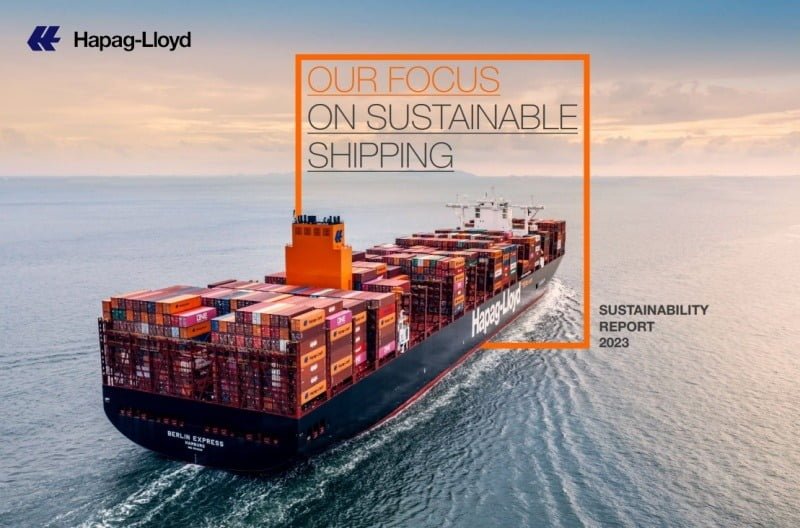Hapag-Lloyd, a global leader in maritime logistics, has unveiled its highly anticipated Sustainability Report for the year 2023. The comprehensive document showcases the company’s steadfast dedication to environmental stewardship and social responsibility, highlighting a myriad of initiatives and achievements aimed at fostering a more sustainable shipping industry.
In its pursuit of greener operations, Hapag-Lloyd has made significant strides towards its ambitious goal of achieving a net-zero fleet by 2045. The report reveals a notable reduction of 0.8 million tonnes in absolute greenhouse gas emissions compared to the previous year, a feat attributed to various eco-friendly measures.
Among these measures is the substantial increase in the utilization of bunkered biofuel blend, surpassing 200,000 tonnes in 2023. Furthermore, the successful deployment of three new dual-fuel vessels, capable of operating on liquefied natural gas (LNG) and future alternative fuels, underscores the company’s commitment to embracing sustainable technologies.
Moreover, Hapag-Lloyd has emerged as a vocal advocate for industry-wide change, actively collaborating with four leading shipping lines to advocate for an end date for fossil fuel-powered newbuilds. The company’s engagement extends to joining the Green Corridor Consortium, an initiative aimed at reducing emissions along crucial shipping routes, exemplifying its dedication to fostering collective action towards a greener future.
In addition to its environmental initiatives, Hapag-Lloyd remains steadfast in its commitment to social responsibility. The company has implemented robust measures to address human rights issues across its supply chain, enhance diversity and inclusion within its workforce, and improve the welfare of its seafarers. Expanded social engagement efforts, including partnerships with organizations like One Earth – One Ocean and 4Life Solutions, further underscore Hapag-Lloyd’s commitment to making a positive impact on communities worldwide.
Rolf Habben Jansen, CEO of Hapag-Lloyd, reaffirmed the company’s firm dedication to sustainability, emphasizing that sustainable practices are not merely choices but imperatives in today’s global landscape. He reiterated the company’s commitment to aligning with the goals of the Paris Agreement and emphasized the importance of fleet optimization, propulsion technology innovation, and the adoption of alternative fuels in achieving these objectives.
Hapag-Lloyd’s latest Sustainability Report serves as a testament to its pioneering efforts in driving sustainability within the maritime industry. With a resolute commitment to environmental stewardship and social responsibility, the company continues to chart a course towards a more sustainable future for all stakeholders.
Click here to read more at Hapag-Lloyd website.
About Hapag-Lloyd
Hapag-Lloyd stands as a prominent figure in the maritime industry with a fleet boasting 266 modern container ships, totaling a transport capacity of 2.0 million TEU (twenty-foot equivalent units). Employing approximately 13,500 individuals and operating 403 offices spread across 140 countries, the company commands a significant presence in the Liner Shipping segment. Notably, Hapag-Lloyd’s container capacity stands at 2.9 million TEU, inclusive of a robust fleet of reefer containers renowned for their size and modernity. Facilitating seamless connectivity, the company operates 113 liner services globally, ensuring swift and dependable links between over 600 ports across all continents.
In the realm of Terminal & Infrastructure, Hapag-Lloyd maintains equity stakes in 20 terminals situated in strategic locations across Europe, Latin America, the United States, India, and North Africa. With a dedicated workforce of approximately 2,900 employees, the Terminal & Infrastructure segment delivers complementary logistics services alongside terminal operations at selected sites, further enhancing the company’s comprehensive service offerings.
Source Hapag-Lloyd

